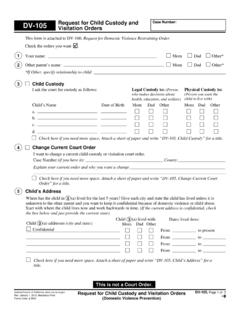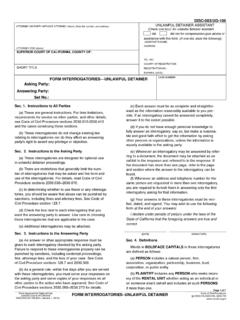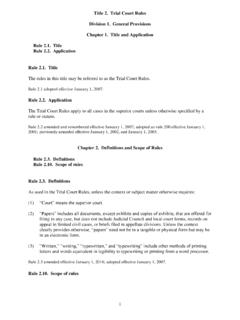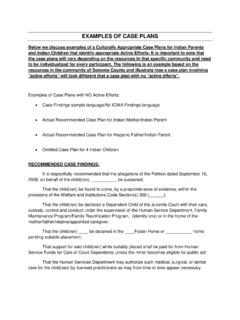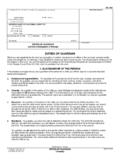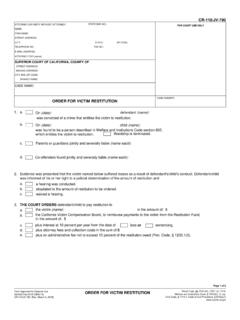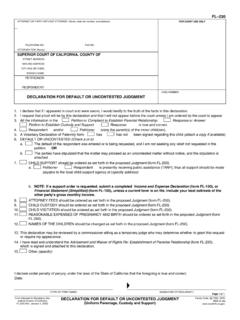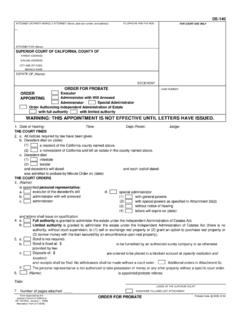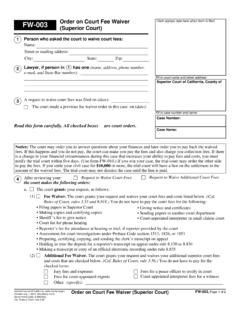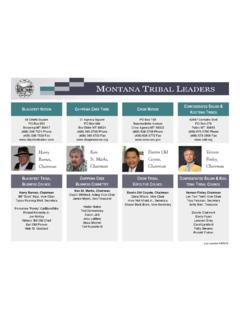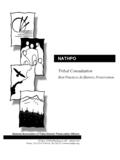Transcription of Following The Spirit of the Indian Child Welfare Act (ICWA)
1 Following The Spirit of the Indian Child Welfare Act (ICWA) A guide to understanding the benefits of providing culturally appropriate services to Native American families from non federally recognized tribes within the juvenile dependency and delinquency systems1 In an effort to ensure proper inquiry and noticing and to reduce the number of ICWA-related appeals in Child Welfare cases, this handout is intended to help social workers and others respond when they encounter children and families that report American Indian or Alaska Native ancestry yet find they are not from a federally recognized tribe. What is good social work practice in these cases, and how can courts support culturally centered practice that results in positive outcomes? How to Provide Spirit of the Law ICWA Services Find out which tribes and Native American resources are in your area. Visit and establish connections with local tribes and Native American resources regardless of federal recognition status.
2 Request ICWA training from tribal resources, California Department of Social Services training academies, or with staff from the Judicial Council of California. Conduct a proper inquiry of possible Native American ancestry in every case at the front end and throughout the duration of the case if family members provide additional lineage information. Connect a Child and family with their tribe and local Native American resources regardless of tribal affiliation. Assist the Child or family with the tribal enrollment process but understand it is up to the tribe to determine who is or is not eligible for enrollment. Conduct placements consistent with ICWA placement preferences even though not technically required. In the case of non federally recognized tribes, tribal members would likely meet requirements as nonrelated extended family members because tribal communities tend to be related or close-knit communities.
3 Consider the Child s tribal members as viable options for holiday visits, tutors, mentors, Court Appointed Special Advocates, etc. 1 This document was developed with the Fresno County Department of Social Services, Child Welfare Services, and Placer County System of Care as part of the American Indian Enhancement of the Casey Family Programs/ Child and Family Policy Institute of the California Breakthrough Series on addressing disproportionality 2009 2010 in collaboration with the American Indian Caucus of the California ICWA Workgroup, Child and Family Policy Institute of California, Stuart Foundation, and Tribal STAR. The Benefits of Providing Spirit of the Law ICWA Services If the Child s tribe is seeking federal recognition and is granted such recognition, formal ICWA case services, such as active efforts to prevent the breakup of the Indian family, will be required.
4 If ICWA active efforts are attempted before the federal recognition, it is less disruptive for the Child than having to change services and placement to make them in accordance with ICWA. Welfare and Institutions Code section leaves the determination of services to individuals of non-recognized tribes to the discretion of the court that has jurisdiction. Even if individuals are not associated with a federally recognized tribe, they can still be part of an Indian community, which can serve as a strength and provide resources that enhance resilience factors for youth. Native American agencies that serve youth regardless of their tribe s status can have youth groups that provide mental health and substance abuse services as well as fun trips, at no cost to the county. Many resources available to Native Americans do not require status in a federally recognized tribe (such as tribal Temporary Assistance for Needy Families (TANF), Native American health centers, and title VII Indian education programs).
5 Some Native American health centers can access funding for residential treatment in and out of the state for children who are from non federally recognized tribes. When culturally centered practice is provided as early as possible, it can result in positive outcomes for tribal youth. Linking a Child to cultural resources that support his or her development into a healthy self-reliant adult can reduce the number of times the person may enter public systems. Culturally centered practice provided at the front end and throughout the lifespan of the case, regardless of the recognition status of the tribe, can reduce the public burden of cost over time. Historical Background In 1848, gold was discovered in Coloma, California. In 1851 and 1852, representatives of the United States entered into 18 treaties with tribes throughout California that would have provided for more than million acres of reserve land for the tribes use.
6 These treaties were rejected by the Senate in secret session. The affected tribes were given no notice of the rejection for more than 50 years, and the promised reserve lands were never provided. In 1928, a census was conducted to determine the number of American indians in California, resulting in the establishment of the 1933 California Indian Rolls (also referred to as the California Judgment Rolls). The purpose of the census and the rolls was to determine the number of indians in California who had families alive in 1851 1852, when treaties were signed by the original Californians. From 1953 to 1964, called the Termination Era, the Congress terminated the federal recognition status of more than 40 California tribes. These tribes were deemed as not federally or state recognized, though previously descendants of these tribes were federally recognized. Many tribes that were terminated are currently seeking federal recognition by the government.
7 Tribal communities throughout California are active and thriving, whether or not they have federal recognition. Descendants of family members listed on the California Judgment Rolls can use this documentation of Native American ancestry to provide information as to tribal affiliation. Note: Finding an ancestor on the roll does not mean an individual is an enrolled member in that particular tribe. Only one tribe can be listed on this document, and it is possible to descend from more than one tribe. Senate Bill 678, passed in 2006 by the California Legislature, allows participation of non federally recognized tribes, on request and at the discretion of the judge in the dependency matter. This expands the option and availability of culturally appropriate services to children from non-recognized tribes. Additional Tips for Practice Some tribes include descendants as members, not only those who are enrolled.
8 Best practices will vary depending on the location, available resources, and tribe. If you are having challenges in working with the family, local Native American agencies or tribes can assist. If the family requests additional resource information to trace its lineage, you can provide the Following resource information: o The tribe; o Mission church records; o Mormon genealogical records; o Historical societies and museums; o Genealogical Web sites; and o Historical statistical information and documents in the county of the family s origin.
